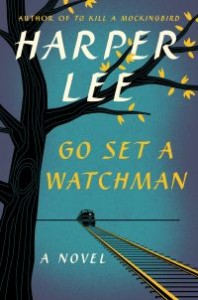 My first completed book of the year is Harper Lee’s Go Set a Watchman. Despite all the criticism of the book, I thought it was superb. They say it was a draft. May I be so blessed as to write such drafts! If Lee announced she had a forthcoming volume of scrap stories about Jean Louise’s childhood, I would pre-order it today (or at least I’d start looking for a sale!). I love the way she writes, and the childhood stories are a favorite part of her books for me. So, even if such a collection had no great moral tale, I’d enjoy reading it.
My first completed book of the year is Harper Lee’s Go Set a Watchman. Despite all the criticism of the book, I thought it was superb. They say it was a draft. May I be so blessed as to write such drafts! If Lee announced she had a forthcoming volume of scrap stories about Jean Louise’s childhood, I would pre-order it today (or at least I’d start looking for a sale!). I love the way she writes, and the childhood stories are a favorite part of her books for me. So, even if such a collection had no great moral tale, I’d enjoy reading it.
I haven’t closely followed all the discussion about Go Set a Watchman, but from the general talk, I had heard two main complaints: 1) as a draft it needed further editing and 2) disappointment with Atticus who now appears as a racist. I found neither criticism compelling.
On the editing, just about any work could be further edited. Fine. But this is a compelling story as it stands. To Kill a Mockingbird was masterpiece and the foreshadowing and parallelism was brilliant. I did not see the same in this book, but that is no real criticism. There are some dangling story lines that I’d like to see completed (What will she do with Hank? Personally, I like him!), but that is not uncommon in novels. The main point of the story is resolved, and that is what is required (more on that below).
Then, it seems the main complaint is that our hero Atticus is tarnished. This response is understandable at one level, because it is a testimony to the power of the previous book. It seems most readers had a similar experience to me in being completely taken with Atticus. He is the exemplary father, the strong, quiet, faithful man. So, any disappointment with such a hero is bound to go hard. But, that is the point of Go Set a Watchman. I wonder if those who complain about the book caught its point. This book, unlike its predecessor, is not a morality tale on race. It is primarily a coming of age tale. The racial tension in Maycomb is not central. Instead the central point is the need for Jean Louise to become her own person- still respecting and loving her father, to see he is only a man and to stand on her own two feet. This is an important point in life. Mockingbird stoked my desires to be a good father. Watchman reminded me to give my children, particularly my sons who are beginning to set out on their own, the opportunity to move out from under my shadow. I long to be a faithful, strong example for them, but not for them to be lost in my shadow, thoughtlessly imitating me. I want them to own their faith and stand on their own two feet. That is what Watchman is about.
So, if you object to Atticus’s handling of the racial tensions in Maycomb, so be it. Make a good argument and stay by it as he encouraged his daughter to do. This reminds us as well how complicated such issues are at the time they arise. Living well through them is much different from assessing them from the cool, convenient distance of history. Good men wrestled with the issues of their day and none handled them perfectly. Let us wrestle carefully then today.
And, good fathers teach, train and provide examples. Then, they prod their children out of their nest to try their own wings. Such prodding can be painful, but good parents will embrace the difficulty for the joy set before them.